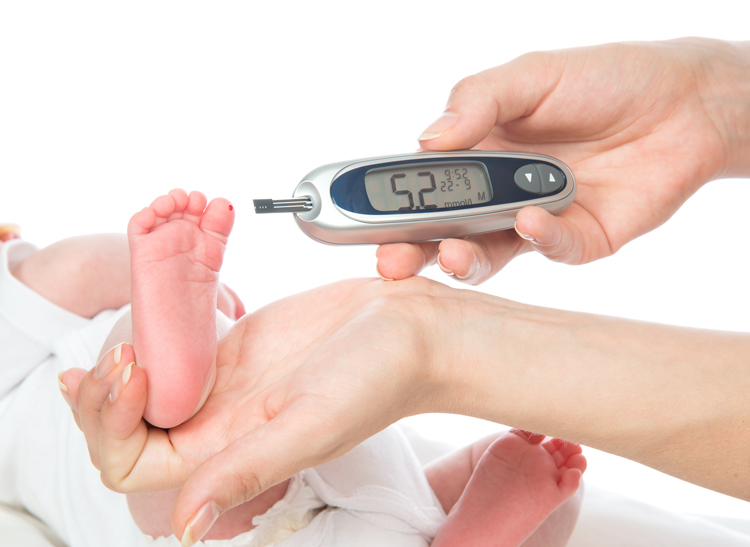
Newborn screenings are a set of tests performed on your baby 2-3 days after birth, before leaving the hospital. These screening tests check for serious disorders particularly for certain genetic and metabolic disorders. About 1 per 1000 babies will be diagnosed with a disorder as a result of newborn screening. A baby born with one of these disorders usually does not show any symptoms right away. However, if not treated as soon as possible these disorders can develop into serious health problems like mental retardation and even death.
These disorders can affect:
- How the body breaks down protein
- How the body makes energy
- How the body gets nutrients from food
- The immune system
- Hormones
- Red blood cell function
NEWBORN SCREENING LABORATORY TEST
When a baby is 48-72 hours old, a few drops of blood is taken from the baby’s heel. This is called a heel stick. The blood is usually placed on a small card. The card is sent to a laboratory where it is screened for different metabolic and genetic conditions.
It is important to know that after 5 days some tests cannot anymore be screened accurately using this sampling method therefore the newborn screening must be done timely.
WHAT HAPPENS IF MY BABY DOES NOT PASS THEIR NEWBORN SCREEN?
It is important to remember that newborn screening is just a screening test. If your baby does not pass their newborn screen, or has an abnormal newborn screening result, it does not mean they have the condition. It just means that more testing must be done to figure out if your baby really has the disorder and exactly which disorder.
HOW WILL I GET THE RESULTS OF THE TEST?
Your Paediatrician caring for your newborn will be notified of screening test results and will discuss the results with you. The test results will take 2 – 3 days if performed in Viet Nam where only a simple 2 test panel (Vietnam) is available or 7 – 10 days if sent overseas to France for a more comprehensive 4 test panel. If additional tests are needed, you will be informed by your Paediatrician.

WHAT TESTS ARE AVAILABLE IN FV HOSPITAL?
Panel Vietnam screens for:
- Endocrine Disorders that includes 2 tests: TSH (Thyroid Stimulating Hormone) & 17OH (17OHhydroxyprogesterone)
- G6PD deficiency (Glucose-6-Phosphate Dehydrogenase)
Panel France screens for many disorders:
- Endocrine Disorders that includes 2 tests: TSH (Thyroid Stimulating Hormone) & 17OH (17OHhydroxyprogesterone)
- G6PD deficiency (Glucose-6-Phosphate Dehydrogenase)
- Galactosemia
- Metabolic Disorders (includes 3 groups of tests for amino acids, organic acids and fatty acid oxidation disorders)
ENDOCRINE DISORDERS (PANEL VIETNAM & FRANCE)
Endocrine disorders occur when there is a problem with the amount of hormones (chemical messengers in our body). The hormones of interest are called Thyroid Stimulating Hormone (TSH) and 17-hydroxyprogesterone (17OH). The endocrine disorders identified with newborn screening are congenital hypothyroidism and congenital adrenal hyperplasia respectively. These disorders are managed through medicated treatment.
G6PD DEFICIENCY (PANEL VIETNAM & FRANCE)
G6PD deficiency is an inherited condition in which the body does not have enough of the enzyme glucose-6-phosphate dehydrogenase, or G6PD, which helps red blood cells (RBCs) function normally. This deficiency can cause haemolytic anaemia (premature breakdown of red blood cells), usually after exposure to certain medications, foods, or even infections. This disorder is managed through avoidance of oxidative stressors such as certain medication and fava beans.
GALACTOSEMIA (PANEL FRANCE ONLY)
Galactosemia results when a specific enzyme (a type of protein) in the body, called galactose-1-phosphate uridyltransferase (GALT), cannot break down galactose (a sugar found in milk). When this enzyme isn’t working correctly, galactose builds up in the body and causes health problems. This disorder is managed through dietary preventative treatment.
METABOLIC DISORDERS (PANEL FRANCE ONLY)
Metabolic disorders occur when there is a problem with how our body breaks down food into its simpler components: proteins, fats, and carbohydrates. They are grouped into three categories: amino acid disorders, fatty acid oxidation disorders, and organic acid disorders. Over 20 metabolic disorders will be screened in this panel which are rare but can be life threatening if dietary preventative treatment as well as medication are not administered early in life.

 Vi
Vi 












